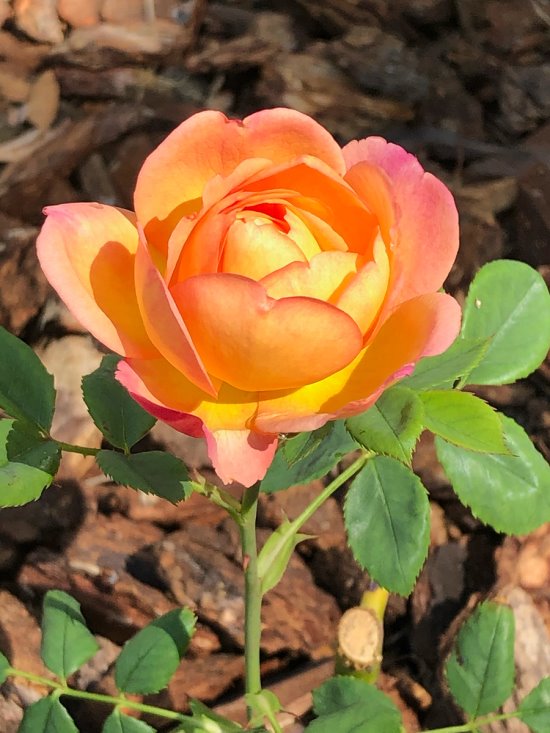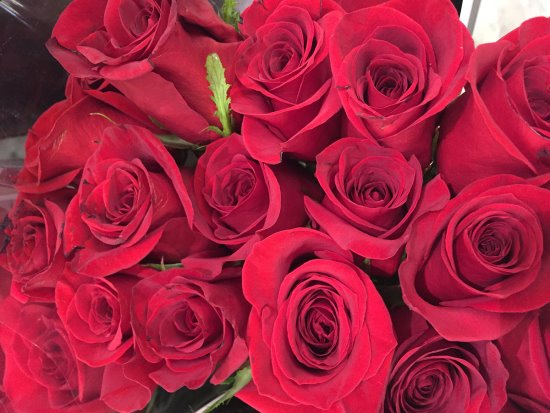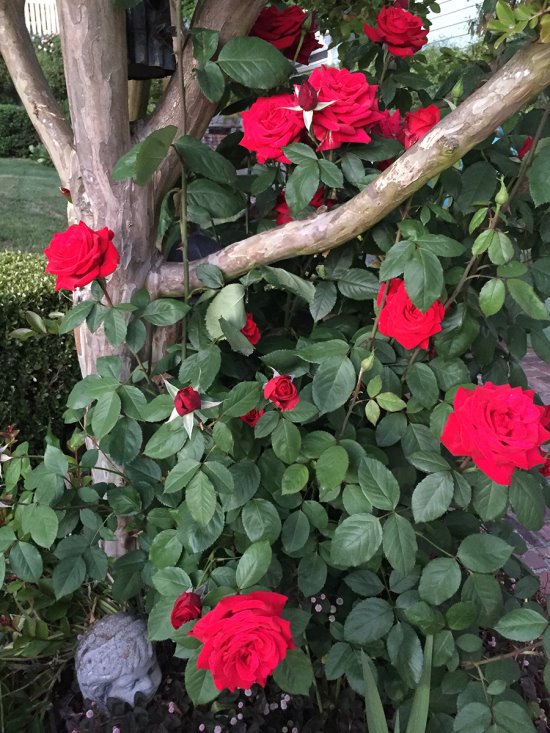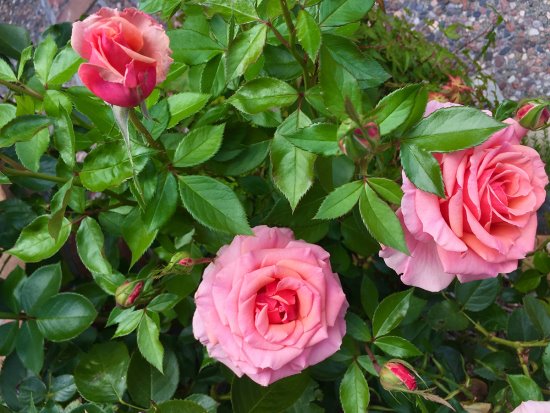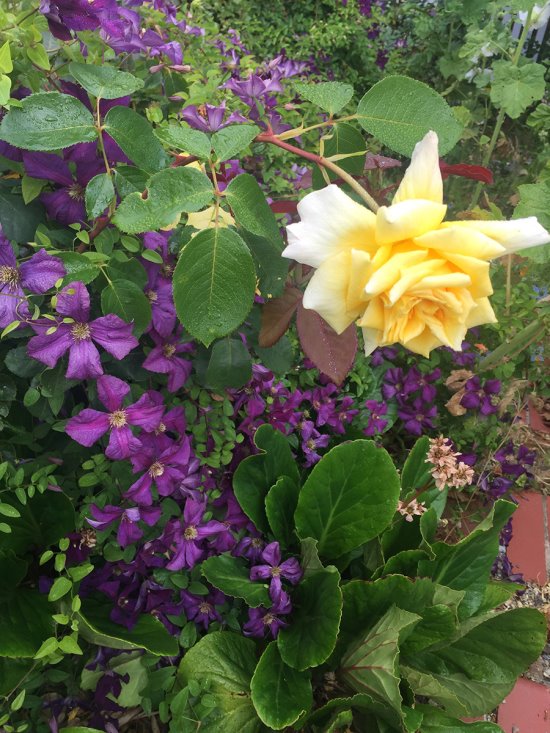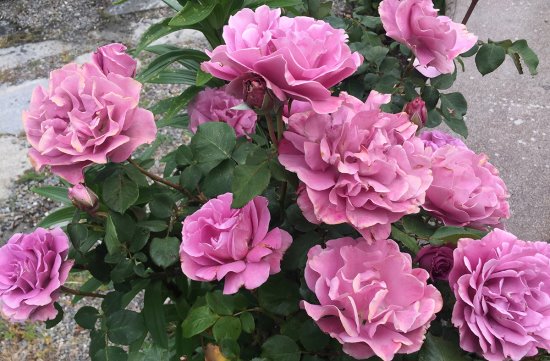 |
|
|
The lavender-hued Angel Face rose. Photos Cynthia Brian
|
|
|
|
|
|
"I love to prune my roses. That's the one thing I really feel I do pretty well!" ~ Julie Andrews
 My roses are still blooming, and the bushes are filled with leaves. Yet, it is February and time to do the heavy pruning. My grapevines are already pruned, but I've been waiting for my roses to remember it is winter before I cut them back. Towards the middle to end of January used to be the optimum weeks to prune roses. Last year, I didn't prune until late February and this year will be the same. Pruning any later in the season will deplete the plant's energy resulting in spindly shoots. Normally within two months of pruning, the roses are once again touting their fragrant flowers. I gave over 100 canes of my various roses to my neighbor last season. She rooted three or four canes per container of potting soil and by May those canes were blooming.
My roses are still blooming, and the bushes are filled with leaves. Yet, it is February and time to do the heavy pruning. My grapevines are already pruned, but I've been waiting for my roses to remember it is winter before I cut them back. Towards the middle to end of January used to be the optimum weeks to prune roses. Last year, I didn't prune until late February and this year will be the same. Pruning any later in the season will deplete the plant's energy resulting in spindly shoots. Normally within two months of pruning, the roses are once again touting their fragrant flowers. I gave over 100 canes of my various roses to my neighbor last season. She rooted three or four canes per container of potting soil and by May those canes were blooming.
 Ah, roses. They are one of nature's super spectacular specimens. Fossil evidence in Oregon and Montana indicates that the rose dates back at least 35 million years, long before humans appeared on the landscape. Cultivation probably began in China more than 5,000 years ago. In the 17th century, roses and rose water were used as payment for goods and barter. Late in the 18th century, China introduced cultivated roses to Europe. Throughout history, roses have been used for perfume, medicine, symbolism, and legal tender.
Ah, roses. They are one of nature's super spectacular specimens. Fossil evidence in Oregon and Montana indicates that the rose dates back at least 35 million years, long before humans appeared on the landscape. Cultivation probably began in China more than 5,000 years ago. In the 17th century, roses and rose water were used as payment for goods and barter. Late in the 18th century, China introduced cultivated roses to Europe. Throughout history, roses have been used for perfume, medicine, symbolism, and legal tender.
 For many years, I've had the privilege of chatting with various expert rosarians across the globe. The one piece of advice that is common to all is the recommendation to lose the fear of pruning. Although there are guidelines for proper pruning, if you make a mistake, or don't follow the directions, most likely the rose bush will survive despite your best efforts to give it a bad cut.
For many years, I've had the privilege of chatting with various expert rosarians across the globe. The one piece of advice that is common to all is the recommendation to lose the fear of pruning. Although there are guidelines for proper pruning, if you make a mistake, or don't follow the directions, most likely the rose bush will survive despite your best efforts to give it a bad cut.
 The reasons for pruning are numerous. Pruning does the following:
The reasons for pruning are numerous. Pruning does the following:
 1. Creates a plant that will flower with high-quality blooms.
1. Creates a plant that will flower with high-quality blooms.
 2. Shapes the bush into an attraction that fits with the garden.
2. Shapes the bush into an attraction that fits with the garden.
 3. Removes deadwood and diseased stems.
3. Removes deadwood and diseased stems.
 4. Removes canes that are weak or rubbing against one another.
4. Removes canes that are weak or rubbing against one another.
 5. Stimulates new growth.
5. Stimulates new growth.
 Pruning is cathartic and good for the soul of humans! It is a garden chore that I always encourage a homeowner to do herself as opposed to hiring someone to do this chore. Tools of the trade include heavy-duty garden gloves, a sharp-edged pruning shear, and long-handled loppers for those thick canes. Sterilize your tools before you begin the task, then get up close and personal.
Pruning is cathartic and good for the soul of humans! It is a garden chore that I always encourage a homeowner to do herself as opposed to hiring someone to do this chore. Tools of the trade include heavy-duty garden gloves, a sharp-edged pruning shear, and long-handled loppers for those thick canes. Sterilize your tools before you begin the task, then get up close and personal.
 How to Prune:
How to Prune:
 Most roses are not fussy when it comes to how they are pruned. Repeat flowering shrub and bush roses are the most forgiving. English roses, hybrid teas, floribundas, patio, and miniatures can be pruned similarly. Reduce their height by 1/3 to 2/3 depending on how you want your plant to look and how tall you want the plant to grow. Thin stems to aid in disease control.
Most roses are not fussy when it comes to how they are pruned. Repeat flowering shrub and bush roses are the most forgiving. English roses, hybrid teas, floribundas, patio, and miniatures can be pruned similarly. Reduce their height by 1/3 to 2/3 depending on how you want your plant to look and how tall you want the plant to grow. Thin stems to aid in disease control.
 Since the goal of climbing and rambling roses is to climb and cover a pergola, fence, or other structure, only light pruning is necessary. Flowers are produced on side shoots which can be reduced to three or four buds, depending on the appearance you wish. If you must choose between cutting out an old shoot or a new shoot, always prune the old and save the new.
Since the goal of climbing and rambling roses is to climb and cover a pergola, fence, or other structure, only light pruning is necessary. Flowers are produced on side shoots which can be reduced to three or four buds, depending on the appearance you wish. If you must choose between cutting out an old shoot or a new shoot, always prune the old and save the new.
 Many of the Old Roses like Gallicas, Damasks, and Albas that only bloom once will only flower on shoots from stems that are at least a year old. If you prune once-flowering roses too heavily, you will have no flowers. When they are 5 or 6 years old with tired-looking stems, you can cut them out to encourage new growth and flowering.
Many of the Old Roses like Gallicas, Damasks, and Albas that only bloom once will only flower on shoots from stems that are at least a year old. If you prune once-flowering roses too heavily, you will have no flowers. When they are 5 or 6 years old with tired-looking stems, you can cut them out to encourage new growth and flowering.
 After you have pruned, offer the healthy canes of non-trademarked species to friends and neighbors who would like to begin propagating roses. Or cultivate a new rose garden for yourself by dipping the canes in a rooting hormone then planting in a container with good quality potting soil. Clean up any leftover stems, remove leaves from the bushes, and add to the compost pile.
After you have pruned, offer the healthy canes of non-trademarked species to friends and neighbors who would like to begin propagating roses. Or cultivate a new rose garden for yourself by dipping the canes in a rooting hormone then planting in a container with good quality potting soil. Clean up any leftover stems, remove leaves from the bushes, and add to the compost pile.
 To add to your collection of roses, purchasing bare root and planting in February is a cost-saving way to go that will yield blooms in late spring. Once you've brought your bare roots home, soak them in a bucket of water overnight and then allow them to drain for 30 minutes before planting. Never allow the roots to dry out. Check the roots for any damage and trim as necessary. If the roots look good, do not trim or cut.
To add to your collection of roses, purchasing bare root and planting in February is a cost-saving way to go that will yield blooms in late spring. Once you've brought your bare roots home, soak them in a bucket of water overnight and then allow them to drain for 30 minutes before planting. Never allow the roots to dry out. Check the roots for any damage and trim as necessary. If the roots look good, do not trim or cut.
 Roses thrive in humus-rich, water-retentive soil with a pH of 6.5. Choose a bright, sunny location void of competition for root space, water, and nutrients. Improve the soil with rotted manure and compost and dig a generous size hole. Read directions on the package to determine the optimum hole size. Augment with mycorrhizal fungi to improve water supply and nutrients. Plant the bud union two inches below ground level. Water well. In spring, you'll want to add a layer of mulch or compost around each plant and fertilize the roses. Companion plant with lavender to encourage beneficial insects to be on pest patrol.
Roses thrive in humus-rich, water-retentive soil with a pH of 6.5. Choose a bright, sunny location void of competition for root space, water, and nutrients. Improve the soil with rotted manure and compost and dig a generous size hole. Read directions on the package to determine the optimum hole size. Augment with mycorrhizal fungi to improve water supply and nutrients. Plant the bud union two inches below ground level. Water well. In spring, you'll want to add a layer of mulch or compost around each plant and fertilize the roses. Companion plant with lavender to encourage beneficial insects to be on pest patrol.
 Your roses will be lush, blooming, and beautiful just in time for barbecues and patio parties. By Mother's Day, you'll be picking bouquets. Instead of buying cut roses for Valentine's Day, consider giving the gift of a potted rose plant. Miniatures make great gifts.
Your roses will be lush, blooming, and beautiful just in time for barbecues and patio parties. By Mother's Day, you'll be picking bouquets. Instead of buying cut roses for Valentine's Day, consider giving the gift of a potted rose plant. Miniatures make great gifts.
 Now, back to pruning my roses because I do it pretty well, too!
Now, back to pruning my roses because I do it pretty well, too!
 Happy Gardening. Happy Growing. Happy Valentine's.
Happy Gardening. Happy Growing. Happy Valentine's.
|
Cynthia Brian in her office.
Cynthia Brian, The Goddess Gardener, is available for hire to help you prepare for your spring garden. Raised in the vineyards of Napa County, Cynthia is a New York Times best-selling author, actor, radio personality, speaker, media and writing coach as well as the Founder and Executive Director of Be the Star You Are!r 501 c3. Tune into Cynthia's StarStyler Radio Broadcast at
www.StarStyleRadio.com. Buy copies of her books, including, Chicken Soup for the Gardener's Soul, Growing with the Goddess Gardener, and Be the Star You Are!
www.cynthiabrian.com/online-store. Receive a FREE inspirational music DVD and special savings. Hire Cynthia for writing projects, garden consults, and inspirational lectures.
Cynthia@GoddessGardener.com
www.GoddessGardener.com |

